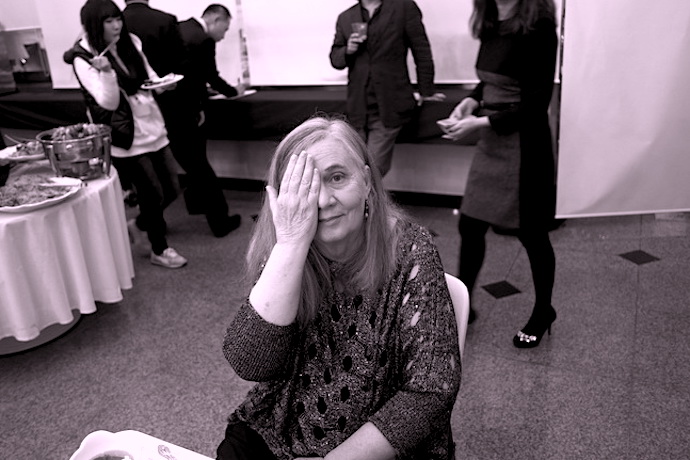Breaking up is hard to do, and I am not at all prepared to discard my deep love and admiration for novelist and essayist Marilynne Robinson. Among her novels, I treasure Lila in particular for its deep tenderness. Among the essays, “The Human Spirit and the Good Society” appeals for its exquisite critique of prevailing neo-Darwinian ideas about who we are and what we’re capable of as human beings. But Robinson’s readers know that all of her essays burst with fresh insight and hum with her spare, quiet authority. Not for nothing has Marilynne Robinson been ranked among the finest writing teachers of this era.
Robinson is also known to be a generous and attentive person. She was generous to me nearly two decades ago when I asked her to contribute an essay for a collection I was editing about the threat of the Christian Right. She delivered a gem titled “Hallowed Be Thy Name” that ended up taking pride of place in that book. It delights me that she happily does the ordinary tasks that faithful members do in her small Congregational church. And who cannot be charmed by what appears to the mutual admiration society established between this distinguished scholar/teacher/artist and Barack Obama?
Last but not least, Robinson knows her Bible. I mean really knows it. As in mastering biblical Hebrew in order to dig deeply into the subtlest meanings of foundational texts; and, as in understanding why certain of the texts deserve to be called foundational. On the theological side, Robinson has wrestled Calvin’s Institutes and commentaries to the ground. And there is little doubt that she has read more widely into the voluminous scribblings of the English who took Calvinism into the new world than anyone since the legendary Perry Miller.
And this, for me, is where the problem begins: with Calvinism and with the Puritans in particular. Robinson is seriously devoted to those 17th century guys in their conical hats and buckled shoes, and she seems to be increasingly obsessed with getting the rest of us to love them too. Or, at least, to stop ridiculing them as narrow humorless bigots whose preoccupation with sin imparted a permanent unhealthy pallor to American culture. Robinson has a new piece beating this familiar drum in the current issue of Harper’s.
To be clear, I do understand why Robinson would wish to correct the caricature of Puritans as hopeless cranks—a caricature that the intellectuals and humorists of the Roaring Twenties did much to create. But I worry that she contributes to a different distortion when she makes them out to be prototype human rights heroes. And also: enough, already.
In her latest for Harper’s Robinson celebrates a 1641 document called the Massachusetts Body of Liberties. She makes big claims for this document and also for a little-known Puritan divine named Hugh Peters who sailed back to England to serve as Oliver Cromwell’s chaplain before dying a grisly death by torture during the Restoration.
In telling the story of colonists like Peters who were extremely well educated (many with Cambridge degrees) and who represented the most high-minded and cosmopolitan vector within the Protestant Reformation, Robinson wants to make the point that, from the beginning, the American story was about ideas of justice and liberty, not simply about wealth and power. She wishes to make the further point that because of our unwarranted bias against Puritanism, the standard account of American history “smothers what might otherwise be a natural interest in colonial New England as the most progressive society in the world at the time.”
And she wishes us to know that the history of 17th century England and 17th century New England ought to be understood and interpreted as one history in view of the regular intercourse between Boston and London. She maintains that New England emerged as a truly revolutionary society, featuring “radical liberality,” because, even though a significant number of colonists went back to fight the king during the English Civil War (1642-1651), the colonies themselves were more or less left to their own devices during two decades of open warfare and tumultuous Protectorate.
In regard to Robinson’s complaint that the transatlantic connection has been routinely overlooked, we need only look to Kevin Phillips’ The Cousins’ Wars, published more than 20 years ago, which focused a bright light on the revolutionary unity of the two Englands; or to Michael Walzer, who likewise treats the two synoptically in his brilliant short book, Exodus and Revolution. One could cite others—Bernard Bailyn, for example.
As to whether colonial New England’s role as the fons et origo of American liberty has been a neglected topic in American historiography? Here I begin to wonder whether Robinson is having us on. This is a topic that’s been exhaustively, relentlessly pursued, to the extent that many young scholars today—scholars of color in particular—insist that we pay less attention to Plymouth and more to Jamestown as an equally, if not more important, origin story in regard to American understandings of liberty and justice. Robinson argues that Jamestown’s repressive Anglican arrangements, not to mention John Locke’s nakedly hierarchical Fundamental Constitutions of Carolina, simply make her point about the uniqueness and glory of New England freedoms.
But here’s the rub when it comes to Robinson: She avers that “the biases that are brought to bear on American Puritanism would encourage us to imagine that the Liberties are less than they seem.” But is it not possible to acknowledge that the Massachusetts Liberties were indeed advanced for their time (in respect to equal treatment for rich and poor, no imprisonment without trial, etc.) while also recognizing that these freedoms were of principal benefit to white men who were properly covenanted members of the Congregational polity? (Especially as anyone not properly covenanted was vulnerable to a range of penalties, including expulsion or worse.)
In celebrating the long and colorful career of Hugh Peters, Robinson fails to mention that Peters played a major role in the 1637 trial of Anne Hutchinson and was one of the ministers who demanded that Hutchinson be banished from the Massachusetts Bay Colony for holding heretical views. I live in Rhode Island, where Anne Hutchinson and many others persecuted by the Puritans took refuge. Here in a place sneeringly referred to by Cotton Mather as “the fag-end of creation” and “the sewer of New England,” we tend to take a less exalted view of the Puritan liberties that Robinson is so fervently committed to celebrating.
Marilynne Robinson is no fool and no racist; she is acutely aware of the newer historiography that highlights American exceptionalism—and not in a good way. Her Harper’s piece is adapted from a Covid-delayed lecture she gave in Boston to celebrate the 400th anniversary of America’s first Congregational service in 1620 (which sits cheek by jowl with 1619).
Considering that Robinson’s audience, gathered under the auspices of the Congregational Library & Archives, was mostly made up of liberal UCC folks, would it have killed her to make brief mention of the pious settlers’ treatment of the indigenous people—stealing their food, burning their villages, seizing their land—or, for that matter, their treatment of Quakers and of Roger Williams and Anne Hutchinson?
I imagine Robinson believes that mentioning such things might distract from her focus on the good and noble side of figures like Hugh Peters and John Winthrop and Oliver Cromwell. But I have to wonder whether it’s wise or right never to mention the corpses under the floorboards, as it were—to leave that disagreeable business to others.
And this takes me to a still greater omission that hangs over Robinson’s years-long effort to repristinate Puritanism. I alluded earlier to a problematic American exceptionalism: the still-widespread notion that this country can do no wrong because it’s been particularly blessed by God. It turns out that a theologically-based sense of entitlement is actually not so exceptional.
The settlers of New England called themselves the New Israel. But the Dutch Republic—a state closely allied with the English dissenters’ aspirations—had much the same idea about itself. They were God’s Elect and thus could do no wrong as they built up a powerful maritime empire.
As a wonderful recent book by Amitav Ghosh points out, the Calvinist Dutch—seeking spice-based wealth in tiny islands that are now part of Indonesia—followed the same script as the New Englanders when it came to dealing with indigenous people who declined to fall into complete subjection: they “burned everywhere their dwellings.” Ghosh notes that the ruthless slaughter of the Bandanese by the Dutch was eerily paralleled by the English burning of the Pequots in 1637.
Dutch Calvinism is better known for the founding of New Amsterdam during the same period. There, as in Massachusetts, one could find a degree of tolerance coupled with an aggressive colonization program of land theft and slavery. A still more conspicuous example of Dutch settler colonialism corresponding to the general pattern of freedom for us/unfreedom for others is of apartheid South Africa, where a notoriously brutal regime that, just like New England, saw itself as a “New Israel,” survived until 1990.
This is the darker side of Calvinism that Robinson has seldom if ever discussed, and it would really help her case for Calvinist “liberality” if she could also acknowledge the shadow side. For example, she might consider asking the Irish what they think of Oliver Cromwell’s Christian charity.
To my mind it’s Michael Walzer who sets the bar for scrupulosity in discussing the problems inherent in the idea of enjoying God’s special favor. Walzer writes that exodus stories—the original one, of course, but also the exodus stories written by New England settlers and by South African Boers and by the founders of the modern State of Israel—tend to skip lightly over the downside of their God-sent liberation: the taking of others’ land and the effective erasure of the seized land’s inhabitants and of their story.
Walzer asks, “Is it a feature of revolutionary history that newly liberated and covenanted peoples should think about their enemies in this absolutist fashion?” Walzer’s answer is a reluctant yes: he concludes that this does indeed seem to be the case. Messianism can be dangerous, he cautions, and settler colonial regimes can be both “enlightened” and shockingly murderous at the same time.
My unqualified love for Marilynne Robinson could easily return if she were willing to pose Michael Walzer’s question and answer it as truthfully as he does.





